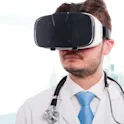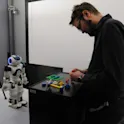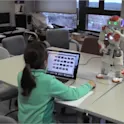
Robotics and AI
31 May 2019
Magnets can help AI get closer to the efficiency of the human brain
New brain-like networks could help robots approach human-like efficiency at object recognition tasks; Frontiers in Neuroscience

Robotics and AI
31 May 2019
New brain-like networks could help robots approach human-like efficiency at object recognition tasks; Frontiers in Neuroscience

Robotics and AI
26 Mar 2019
Scientists have achieved a billion-fold increase in the electrical conductivity of melanin, that could unleash its potential in safe, sustainable bioelectronics; Frontiers in Chemistry

Robotics and AI
07 Jan 2019
A study has shown for the first time that computers can predict individuals’ personality traits from their eye movements while engaged in everyday tasks; Frontiers in Human Neuroscience

Robotics and AI
27 Dec 2018
Researchers at Osaka University have made their robot child face more expressive, by measuring and calibrating 3D movement at over 100 facial areas; Frontiers in Robotics and AI

Robotics and AI
12 Nov 2018
A new study in collaboration with the BBC finds that users feel more engaged in a virtual reality news experience when virtual characters acknowledge them – even by simple gaze; Frontiers in Robotics and AI

Robotics and AI
21 Aug 2018
The VR environment allowed doctors to interact with virtual, avatar patients in the same way as they would in a ‘real’ consultation: Frontiers in Robotics and AI

Robotics and AI
18 Jul 2018
Robots have been a part of our culture for centuries, but it is only in the last decade or two that robotic technology has really become integrated into daily life.

Robotics and AI
26 Apr 2018
A study using deep neural networks suggests that predictive coding theory is the basis of illusory motion: Frontiers in Psychology

Robotics and AI
12 Oct 2017
Soldiers are more likely to open up to a computer-generated virtual interviewer than by taking a survey, say researchers in Frontiers in Robotics and AI

Robotics and AI
22 Sep 2017
Wearable technology described in Frontiers in Robotics and AI can recognize conversational prompts and provide the user with suitable responses.

Robotics and AI
29 Aug 2017
New study, published in Frontiers in Robotics and AI, finds that humans prefer interacting with faulty robots more than with flawless robots.

Robotics and AI
27 Jul 2017
Researchers have developed a concept called Empowerment to help robots and humans to work and live side-by-side safely and effectively.

Robotics and AI
04 Apr 2017
For the first time, researchers in the field of evolutionary robotics have used physically embodied robots to study epigenetic effects on robot evolution.

Robotics and AI
04 Nov 2016
By Ian Salter, Frontiers Science Writer The use of robotic tutors in primary school classrooms is one step closer according to research recently published in the open access journal Frontiers in Computational Neuroscience. Dr Imbernòn Cuadrado and his co-workers at the Department of Artificial Intelligence in Madrid have developed an integrated computational architecture (ARTIE) for use with software applications in schools. “The main goal of our work was to design a system that can detect the emotional state of primary school children interacting with educational software and make pedagogic interventions with a robot tutor that can ultimately improve the learning experience,” says Luis Imbernòn Cuadrado. Online educational resources are becoming increasingly common in the classroom, although they have not taken into sufficient account that the learning ability of primary school children is particularly sensitive to their emotional state. This is perhaps where robot tutors can step in to assist teachers. Rather than focusing on specific emotions, the researchers first identified three cognitive states (concentrating, distracted and inactive) known to influence the course of learning. Keyboard strokes and mouse actions of children using educational software were used to predict which of these cognitive states the child is experiencing and subsequently linked […]

Robotics and AI
26 Oct 2016
By Srividya Sundaresan, Science Writer Recent research shows brain-to-text device capable of decoding speech from brain signals Ever wonder what it would be like if a device could decode your thoughts into actual speech or written words? While this might enhance the capabilities of already existing speech interfaces with devices, it could be a potential game-changer for those with speech pathologies, and even more so for “locked-in” patients who lack any speech or motor function. “So instead of saying ‘Siri, what is the weather like today’ or ‘Ok Google, where can I go for lunch?’ I just imagine saying these things,” explains Christian Herff, author of a review recently published in the journal Frontiers in Human Neuroscience. While reading one’s thoughts might still belong to the realms of science fiction, scientists are already decoding speech from signals generated in our brains when we speak or listen to speech. In their review, Herff and co-author, Dr. Tanja Schultz, compare the pros and cons of using various brain imaging techniques to capture neural signals from the brain and then decode them to text. The technologies include functional MRI and near infrared imaging that can detect neural signals based on metabolic activity of […]
Get the latest research updates, subscribe to our newsletter